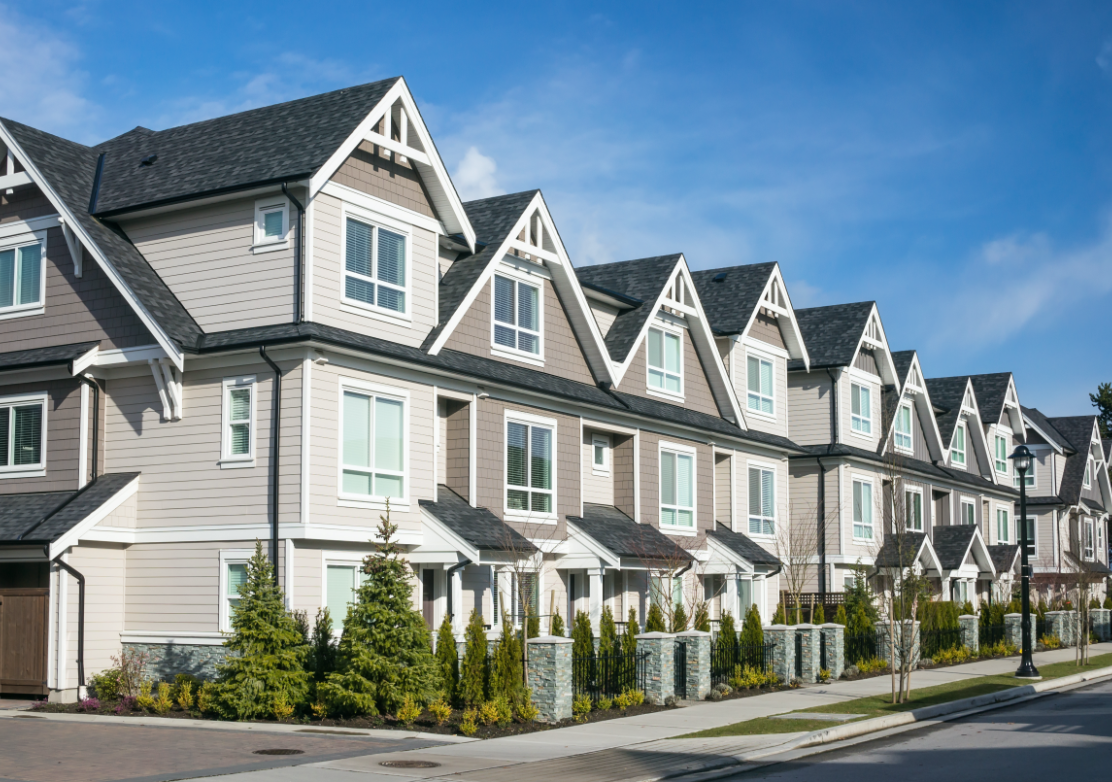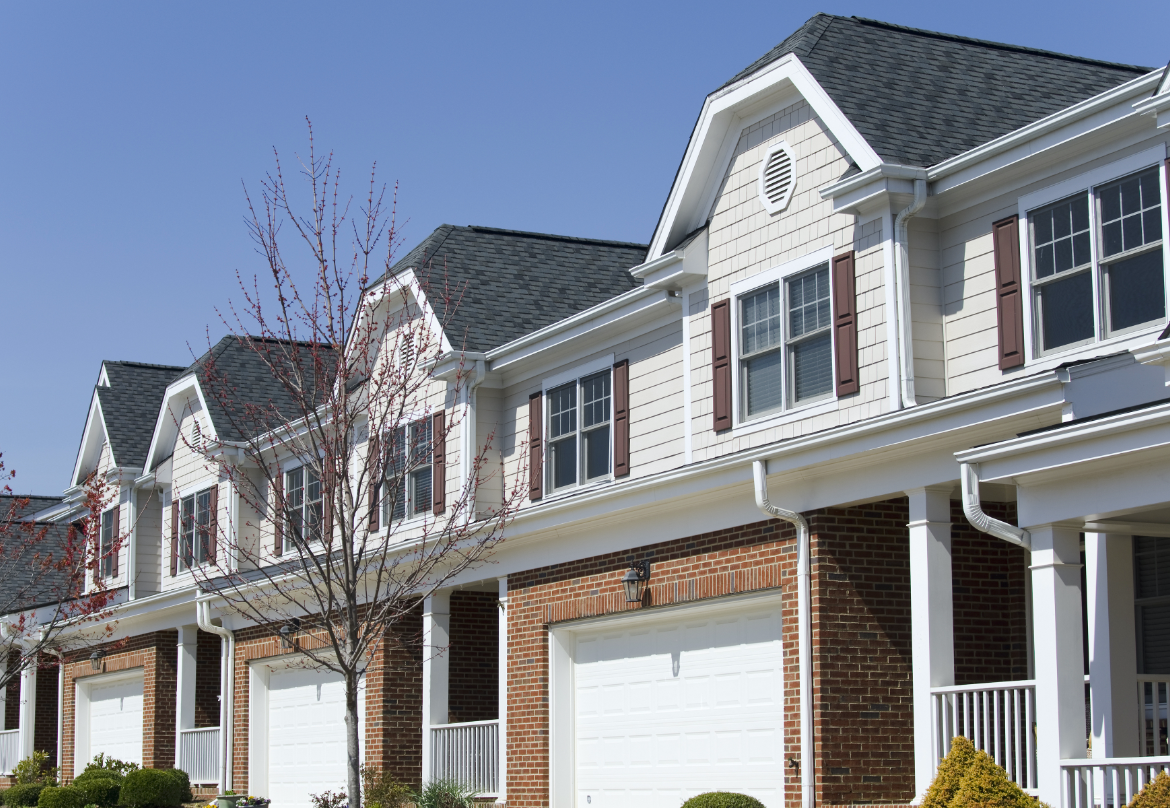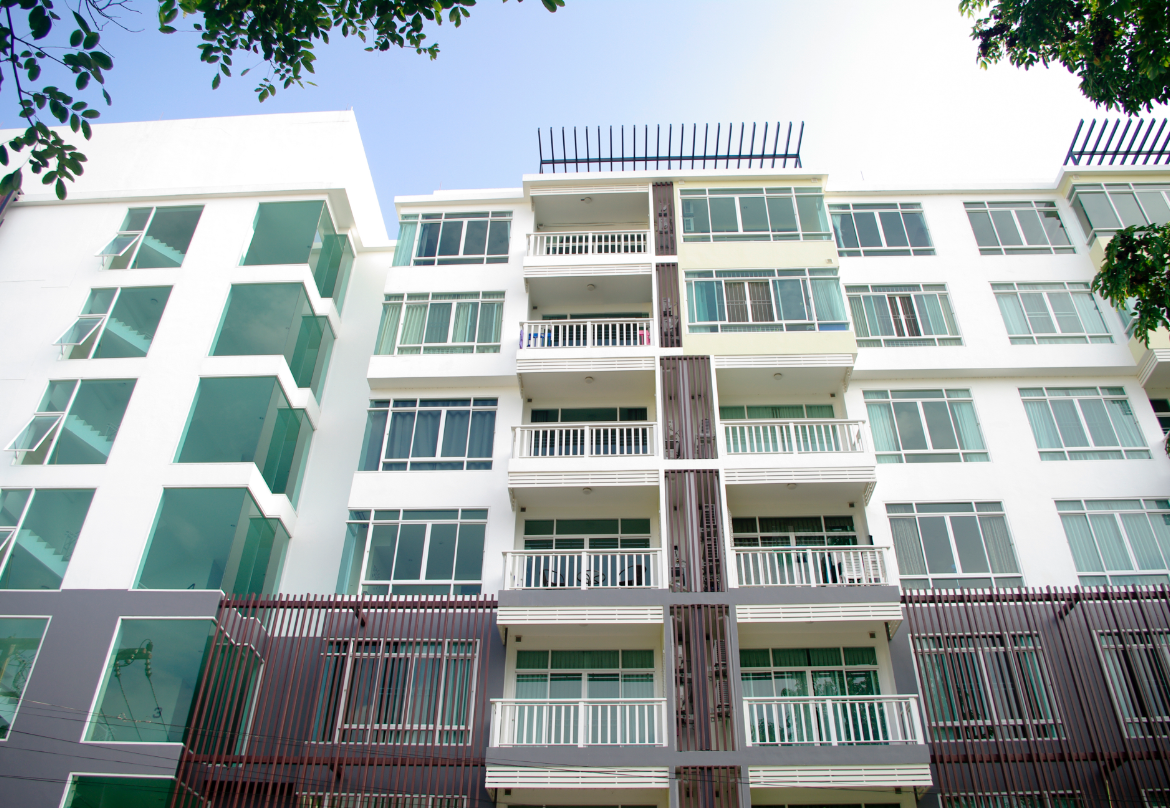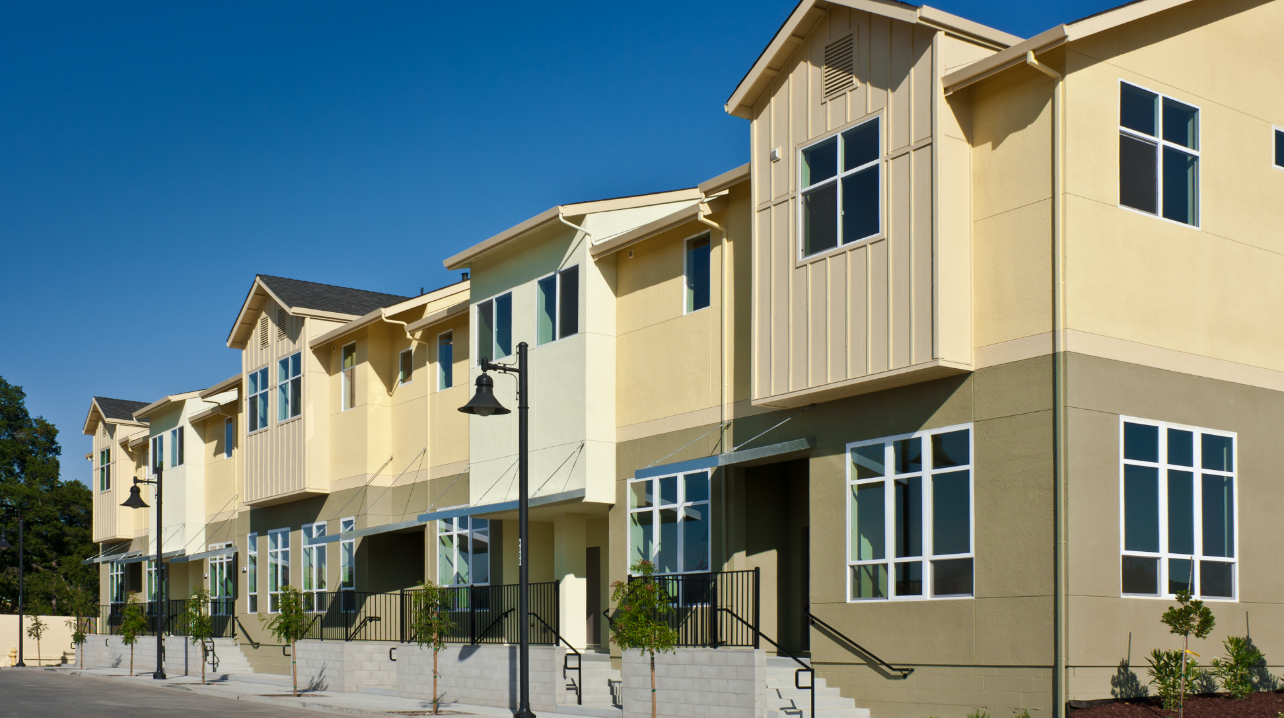Are you considering purchasing a townhouse? Townhouses are regaining popularity among homebuyers. The growth in popularity is due to purchasers seeking low-maintenance townhomes that are close to amenities and offer greater value. Many people prefer to buy a townhouse in a vacation spot in the suburbs as a second home.
The low, or absence of, routine maintenance that comes with owning a home is a big draw for many people. In the vast majority of cases, with townhouse ownership, you will not be liable for exterior care. In that regard, they differ significantly from single-family dwellings.
It's worth noting that the terms "townhouse" and "townhome" are interchangeable and have the same meaning. Let's look at the advantages of living in a townhouse so you can decide whether it's perfect for you.
Everything You Need To Know About What Is A Townhouse
Townhouse Definition
A townhouse is a multi-story home that shares a wall on one or both sides with its neighbors. Newer townhouse developments are more likely to have a uniform appearance and be managed by a homeowners' association.
Condominiums frequently have a homeowners organization that is dedicated to a certain development. Condominium organizations are formed to help a neighborhood maintain a specific standard. Associations, for example, are formed to keep the homes in good maintenance and beauty management.
The HOA is usually funded by the developer who constructs the area and surrounding townhouses. The developer creates the association and the rules and regulations that will govern it.

Everything About Townhome Living
As a home buyer, finding a location to call home is more difficult than it appears. With so many options and factors to consider, you may be having trouble deciding what type of home is best for you or your family. If you want something a little less expensive than a detached single-family home and don't mind sharing walls with your neighbors, a townhouse can be a good option. Next are some things to consider before investing in a townhome.
Differences Between Townhomes And Other Properties
The layout and square footage are the key differences between a townhouse and a home. A townhome is usually substantially smaller than a single-family dwelling. Townhouses are also significantly narrower, have numerous floors, and share outside walls with other townhouses on the street.
Townhouse vs. Condo
Many people have trouble spotting the difference between a townhouse and a condo. Condominium owners only own their unit's interior. In most cases, you own the interior and outside of a townhouse, including the driveway and grass, but not the communal areas.
The most significant distinction between a townhouse and a condominium is the presence of shared areas. Condo owners contribute to the cost of maintaining the shared amenities. Townhouses are not affected by this problem. This is one of the things that you should be aware of.
Condos can be built in a variety of architectural forms, ranging from a high-rise buildings to a ranch to anything that resembles a typical home. On the other hand, Townhomes are typically built in rows, though this is not always the case.
Townhouses are also occasionally built as duplexes. Whether you're buying a townhouse or a condo, it's a good idea to employ some common sense while making your decision.


Townhouse vs. Row House
Row homes and townhouses are sometimes used interchangeably. A row home is not the same as a townhouse. Townhouses can be grouped together or separated within a complex, whereas row houses will line a street in a row. Row houses are often identical, whereas townhomes may have more architectural distinctions.
A row home is a single-family residence that is connected by common walls. Despite the fact that they are classified as single-family homes, the shared wall feature distinguishes them from regular single-family homes.
These are significant changes since it may be difficult to adjust to a row house where adjacent units share one or two walls if you are used to single-family dwellings. The detached house also provides significantly more privacy than townhouses or row houses.
Townhouse vs. Apartment
Apartments are unique in that they are owned by a landlord and rented to everyone. A townhome, on the other hand, can be rented or purchased entirely. Apartments can provide a lower cost of living while also providing better access to entertainment and eateries.
After looking at townhouses for sale, you may decide that renting an apartment is a better option. The experience of living in an apartment building is vastly different from that of most townhome communities. For some, they are excellent choices, while for others, they are not.
Talk To a Real State Expert Today!
Where Is A Townhouse Located?
Townhouses can be found in the country's urban, rural, and suburban locations (in other words, everywhere!). Row homes are a term used to describe older townhouses in a city setting. This type of townhouse isn't usually part of a homeowner's association.
Who Should Get A Townhouse?
These residences can accommodate a wide spectrum of people. A townhome could be the ideal option if you need more space than a condo can supply and have a limited budget. Townhomes provide extra space in a place that might otherwise be beyond of reach, making them appealing to first-time purchasers. We'll show you the home buying process of a townhouse.
First-Time Homeowners
Townhouses are a terrific option for many sorts of homes, but they're especially suitable for first-time home buyers and other budget-conscious consumers.
Homeowners Looking To Downsizing
Do you own a large home that you no longer require? A townhouse is an excellent option to get into a smaller, easier-to-maintain home.
Real Estate Investors
A townhouse can be a wonderful investment property, especially if it's in a desirable location, such as a large urban center or next to a college, where it can be rented out quickly and profitably.
Homeowners Looking For a Second Home
You, too, can live in your rural mansion while visiting your townhouse on business. Alternatively, vice versa! Alternatively, you might buy a townhouse in your favorite holiday destination and rent it out while you're not using it.
What Else Should You Look For?
You should expect reduced property taxes because a townhouse is nearly always on a smaller parcel of land than a single-family home in the same community. Taxes, on the other hand, differ from city to city, county to county, and state to state. A reputable real estate agent can answer any queries you might have concerning property taxes in your community. In addition, most mortgage lenders will include your property taxes in your monthly mortgage payments. When looking for a townhome, also take into account the next factors:
Square Footage
A townhouse sharing walls with other townhouses is less expensive to buy than a detached single-family home in the same neighborhood, even if they have the same square footage.
Number of Rooms
It will depend on the number of people you're moving with; for example, if it’s you and your family, then make sure to find a townhouse that covers all the space needs of each member.
Want To Talk With An Expert?
There is nothing we haven't been able to help with?
Size of the Lot
What are your plans regarding your future in this townhouse? The size of the lot is essential once you consider getting a townhouse. Some of them may have a yard or communal spaces, and some will fall short on them.
Type of Neighborhood
When you're thinking about buying a house, talking to possible neighbors is always a good idea. It's especially vital if you're buying a townhouse because you'll be in close proximity to them. You can also check out the community amenities. Inquire about what they like about the neighborhood and any HOA issues you should be aware of.

The Homeowners Association (HOA)
The Homeowners associations have the power to impose restrictions on everything from the color of your front door to whether you can park in your own driveway (as opposed to your garage).
Before you buy in a certain neighborhood, make sure you understand the HOA rules – and the financial commitment they entail.
HOA Fees
Of course, there may be HOA fees associated with living in a townhouse or condo, which may balance out the property tax savings.
These organizations are elected boards that oversee your complex's amenities and uphold its standards. Now, if you don't have a pool or other similar amenities, your rates will be lower. Some communities require you to pay for your heat as part of your HOA fees.
No matter where you reside, make sure you do the math and include in HOA fees and other costs before deciding if buying a smaller home will save you money on a monthly or annual basis.
CC&Rs
The Declaration of Covenants, Conditions, and Restrictions (CC&Rs) lay forth the rules that govern the HOA community. The CC&Rs spell out the rules and restrictions that govern what you can do with your property. The purpose of the CC&Rs is to protect, preserve, and enhance the community's property values. The requirements are usually reasonable and easy to accept; for example, it's not difficult to agree to a covenant that requires you to mow your lawn and maintain it weed-free. Other restrictions, on the other hand, may obstruct your plans or appear irrational. If you break the CC&Rs, you may incur penalties such as fines and other repercussions.
Pet Restrictions
Some CC&Rs ban or limit the number of pets you can have, such as livestock or particular dog breeds.
Pros And Cons of Townhome Living
Townhome living is an excellent option when doing it right, but like everything, you need to balance all the details before making a decision. Next are some pros and cons of townhome living.
Pros Of a Townhouse
Lower Cost of Living
One of the benefits of this style of a house is it takes up less space than a typical family home. Furthermore, because you share shared walls and have a smaller footprint, townhouses are frequently less expensive than single-family homes in the same neighborhood, even if they have identical square footage.
A townhouse owners this enables you to purchase a property closer to the city center without sacrificing square footage. This might mean more bang for your buck in the neighborhood you wish to reside in. The same is true if you live in a suburban region.
Compact Size Means Cheaper Repairs
A townhouse requires less maintenance due to its smaller size. If the house is part of an HOA, you'll have even less to worry about because the association will take care of much of the outside upkeep. The absence of exterior maintenance is a big selling point for many who buy townhouses.
Many Townhouses Offer Community Facilities
Community facilities—community pools, tennis court, gym— or other such bonuses, are more likely to be found in new developments. Tennis courts and pools are particularly popular in warmer climates because they may be utilized all year.
Furthermore, distinct established organizations made up of residents who participate in activities they enjoy are common.
Outdoor Space Is Often Provided
With townhouses, there is generally only a modest amount of yard space available. This provides you with some outdoor area without requiring a lot of upkeep. You will almost never be required to mow your own lawn or plow your own driveway. Instead, these responsibilities will be delegated to other companies.
The individual owner may be liable for general upkeep things such as the yard on occasion. This is typically done to cut costs and maintain monthly rates for townhouse unit owners as low as possible.
Townhomes Are Energy Efficient
The good news is that townhouses have certain built-in features that help with energy efficiency. A center unit house with shared walls has just two sides open to the elements, which helps to contain heat energy in the unit.
Cons Of a Townhouse
Dealing With HOA
If you live in a home that is subject to an HOA agreement, you may be limited in what you may do with the property.
Before purchasing a townhome, as previously stated, it is critical to review the existing laws and regulations. If you don't want someone to tell you that you can't have a garden or plant flowers, learn the regulations first.
You'll want to determine if the townhouse community is a good fit for you. Townhouses can be fantastic options, but they can also be dreadful if you don't like rules, just like condos.
Many people living in townhouse communities have terrible stories about board members who are utterly unreasonable. In fact, some of them are on the board solely for the purpose of taking a power trip.
Dealing With Noise Pollution
Because there are shared walls with neighbors, you are more likely to hear them. You can expect this noise to be louder than it would be in a different style of a single-family home, and it may come from both sides.
If you don't want to hear from your next-door neighbor, a townhouse might not be for you, as the lack of control over what other people do and how they live is a key disadvantage of living in townhouses. Although, this might also be prevented by stricter HOA rules and regulations about noise among neighbors, so it might not become a problem at all.
Most Townhouses Are Multi-Floor
This may not represent a problem for many people, but it may be for others. People with mobility challenges, for example, may encounter difficulties if their living area is split across several floors, although there are solutions for these situations; small elevators, for example. If this describes you, you should look for a ranch-style condo complex for over 55s.
Less Privacy
In case you own a detached single-family home on a half-acre lot, you have the option of erecting a tall fence and never interacting with your neighbors. A townhouse may not be for you if you desire privacy, as you will most likely share —at least—one wall with a neighbor.
Buying a Townhouse
You need to know how much you can afford to spend before you start looking for a suitable townhouse. While purchasing a townhouse may provide better value for money, it may still be more expensive due to its proximity to central locations.
Along with usual housing expenses, you'll need to account for any HOA fees. Make sure you're clear on what the condo fee includes. Are there any specific assessments coming ahead that you should be aware of? It'll be inconvenient to find out after you've made a purchase that you'll be responsible for a large expense you didn't anticipate.
What Is The Mortgage Needed To Finance a Townhouse?

There is a variety of mortgages accessible to potential townhouse purchasers, just as there are for regular home buyers. In truth, financing a townhome is similar to financing a detached single-family home for the most part. Unlike acquiring a condo loan, where there may be worries or restrictions regarding the condo building, getting a townhome loan is quite simple.
Conventional loans are also a possibility if you have good credit, and they don't always require huge down payments — some conventional loans just require a 5% down payment. If you're still not sure of what kind of loan you'll be eligible for, keep reading and find out your options.
Enter Your San Diego County Address to
Get Your Free Cash Offer
Types Of Mortgages Available For Townhome Buyers
Fixed-Rate Mortgage
With this type of home mortgage loan, the borrower repays the loan over a set length of time and at a set rate of interest, independent of changes or trends that may affect interest rates, causing them to rise or fall. Homebuyers have the option of taking out a loan for 10, 15, 20, 30, or even 50 years.
VA Mortgage
The VA home loan is likewise a government-backed loan. Former US veterans are eligible to receive it, as are the spouses of deceased warriors. The restrictions differ, as do the criteria used to determine who is eligible for the loan. This includes things like how long someone served and whether or not their release was honorable. One of the big advantages is that there is no need for a down payment. The loans are guaranteed by the Department of Veterans Affairs, but they are funded by a traditional lender.
Interest Only Mortgages
Every type of house mortgage loan carries interest. However, this loan is named after the fact that a borrower might choose to pay simply the interest on a loan. This option is only available with this type of loan and is only accessible for a limited time.
Should You Get a Loan To Buy a Townhouse?
If you're a first-time homebuyer, you might want to look into an FHA loan with fewer financial requirements than other mortgages and might be more accommodating for those looking to buy their first house.
Type Of Loan Available For Townhomes

FHA Loan
An FHA loan—backed by the Federal Housing Administration— may be the answer if you have less-than-perfect credit and need a loan with a lower down payment.
The FHA loan is appealing to first-time homebuyers, families with low-to-moderate incomes, and buyers with poor credit scores because of its competitive rates, liberal credit standards, and modest down payments as low as 3.5 percent. Non-traditional forms of credit are accepted. Therefore this is an excellent loan if you don't have a credit score.
Conventional Loan
Many homebuyers opt for conventional mortgages because they provide the best interest rates and loan terms, resulting in a cheaper monthly payment. If you're a first-time buyer with a good credit score who doesn't have a lot of debt, this loan might be a good fit for you. Depending on your needs, a conventional loan allows you to make a small or higher down payment.
For instance, if you put down 20%, you'll have immediate equity in your property and won't have to pay private mortgage insurance (PMI). On the other hand, you might be able to get a traditional loan with as little as a 3% down payment. Let's say that your down payment is less than 20%; then, you'll have to pay private mortgage insurance (PMI) until you have 20% equity in your house.
Financial Tips For Buying A Townhouse

You should be debt-free.

Have enough liquid money in an emergency saving account to cover three to six months' worth of spending.

Have enough money saved (in addition to your emergency fund) to put down at least a 10% deposit on a home. However, 20% is preferable.

Take out a 15-year fixed-rate mortgage with a monthly payment of no more than 25% of your gross income.
Property Tax On a Townhouse
Many taxpayers will share in the tax owed for the land and common areas such as hallways, lobby, and stairs if they live in a condo.
The owner of a townhouse is normally exclusively responsible for paying taxes on the residence and its land, but the square footage is typically much smaller than a single-family home. As a result, a condo or townhouse usually has reduced taxes.
Taxes Vary Based on Where You Live
Each state and community has its own set of real estate tax laws. Rather, these criteria are typically dependent on the unit’s square footage, usage, and lot size. You can obtain local tax information by contacting your city's finance department.
Be Wary Of Added Costs
Similarly, with a townhome, the HOA may be required to maintain the exteriors of the buildings as well as the property surrounding them, raising maintenance costs. The HOA in single-family home development, on the other hand, usually has no maintenance responsibilities for the individually owned homes and property.
How To Sell A Townhouse
After all this about buying townhouses, there’s still the potential flip side of this topic; what about how to sell a townhouse afterward?
As we’ve seen with the pros and cons of a townhouse, these types of homes can be harder to sell compared to single-family houses or apartments. Townhouses are an “In-between” property that can share many of the same disadvantages as single-family houses and apartments, but also a lot of the same opportunities.
So to sell a townhouse, these are some of the most important things to keep in mind:
It’s easier to determine a fair market value
Like apartments, the fair market value of a townhouse can be easier to determine compared to single-family houses. An HOA usually makes sure most homes are similar both outside and inside, so there’s not a lot of variation when it comes to price. Both the homes and the common areas are kept in overall good, uniform shape.
Familiarize yourself with the HOA rules about selling your townhouse
Depending on how active your HOA is, there may be restrictions on where you can position your "For Sale" sign and how you can market the property. Before you decide to sell your townhouse, you should check your community's bylaws at the start of the sale process to see what you may and cannot do.
Once you've found a buyer, you'll normally have to produce papers for your HOA and have your buyer sign a written agreement to HOA rules by a specific time.
If you find the whole process difficult, you can hire a real estate agent to save you a lot of time and trouble with this type of paperwork.
Give potential buyers all the info necessary about living in a townhouse
Varying townhouse communities have different maintenance standards; some homeowners’ organizations are more hands-off, while others will force you to paint your house whether you like it or not. It's critical to provide potential buyers with the full picture, including HOA fees and rules they'll be subject to if they decide to buy in the neighborhood.
Spin HOA fees and regulations as a positive
Fees and rules are sometimes sold as a negative, but avoid that in your case. HOAs have fees and regulations in order to better provide services and amenities, like trash removal, yard upkeep, and pool maintenance, so a homeowner doesn’t have to worry about all those things and just enjoy living in the community.
Spiffy up your townhouse both inside and out.
Clear the clutter from the townhouse's interior. Move furniture around or out of the unit to make your townhouse appear more open and larger to prospective buyers.
Clean the exterior of your townhouse, including the walls. If your exterior is deteriorating, peeling, or damaged, contact your HOA for a cosmetic touch-up—if applicable. If the outer walls are your responsibility and not the association's, you must repair them yourself.
And tell your townhouse neighbor to do the same.
Take a look at the adjacent townhouses. Because townhouse apartments are often close together with a shared wall, the appearance of surrounding units will influence a potential buyer. If your neighbor's unit is unkempt or requires outside upkeep, speak with him. Contact your homeowner’s association if your neighbor refuses to clean or maintain his exterior or yard areas. HOAs typically have guidelines for the outer appearance of townhouse units and will work with you if possible.
A final tip about selling your townhouse, or any property for that matter, is to not give up at the first sign of trouble or if it seems harder than you thought. Few homeowners are lucky enough to sell their properties to the first buyer that comes in and takes your asking price. Keep at it and return to any of our selling tips and see what you can improve each time you have an attached offer.
Townhouse FAQ
We hope this basic guide on townhomes has been of great help for any plans you might have regarding selling or buying a townhouse. If you have any further questions, please contact our team at Sell My Home Fast and let us assist you.
If you have any further questions, please contact our team at Sell My Home Fast and let us assist you.